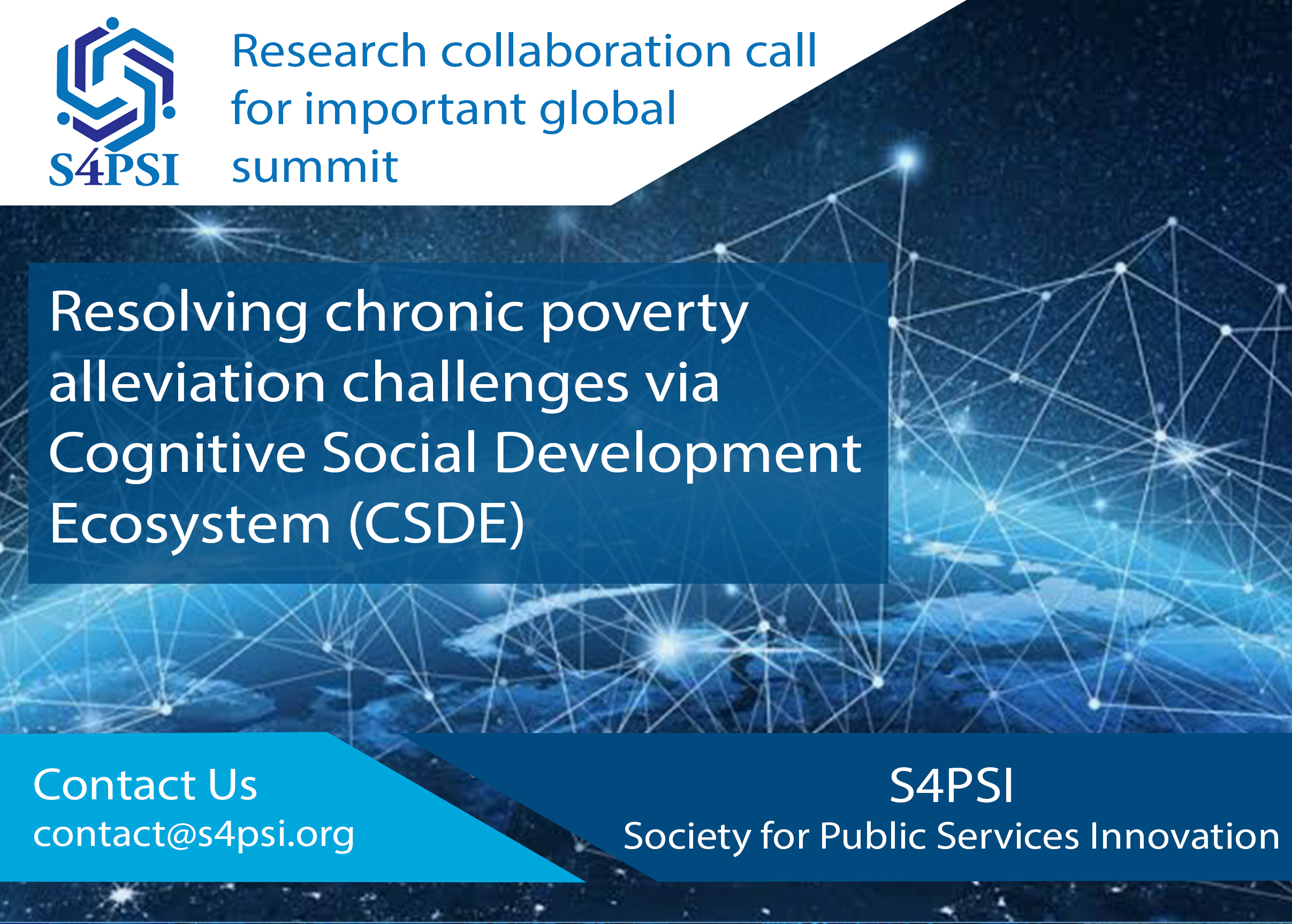
Resolving Chronic Poverty Alleviation Challenges via CSDE
The research project on “Resolving Chronic Poverty Alleviation Challenges via Cognitive Social Development Ecosystem (CSDE)” is an interdisciplinary initiative aimed at addressing persistent poverty challenges through the integration of cognitive technologies, social development strategies, and ecosystem-based approaches. The CSDE research project seeks to advance our understanding of the complex factors underlying chronic poverty and develop innovative solutions to promote sustainable development and social inclusion.
Background and Rationale
- Chronic poverty remains a significant challenge worldwide, affecting millions of individuals and communities across the globe. Despite efforts to alleviate poverty through various interventions, many people continue to experience long-term deprivation, vulnerability, and exclusion.

- The CSDE research project recognizes the need for a comprehensive and holistic approach to poverty alleviation that takes into account the interconnected nature of social, economic, environmental, and cultural factors influencing poverty dynamics.
- By leveraging cognitive technologies, such as artificial intelligence (AI), machine learning (ML), natural language processing (NLP), and predictive analytics, the CSDE research project aims to enhance the effectiveness and efficiency of poverty alleviation efforts by providing insights, decision support, and personalized interventions tailored to the needs of individuals and communities.
Objectives
- Develop a Cognitive Social Development Ecosystem (CSDE):
The CSDE research project seeks to build an integrated ecosystem that leverages cognitive technologies, social development interventions, and stakeholder collaboration to address chronic poverty challenges.
- Identify underlying causes and drivers of chronic poverty
The CSDE aims to analyze the multifaceted nature of chronic poverty and identify the root causes, systemic barriers, and socio-economic determinants contributing to persistent deprivation and inequality.
- Design and implement evidence-based interventions
The CSDE develops evidence-based interventions and policy recommendations informed by data-driven insights, behavioral science principles, and participatory approaches to address the specific needs and vulnerabilities of impoverished individuals and communities.
- Foster collaboration and knowledge sharing
The CSDE facilitates collaboration among researchers, practitioners, policymakers, and community stakeholders to exchange knowledge, share best practices, and co-create innovative solutions for poverty alleviation.
Key Components of the CSDE
- Cognitive Technologies
The CSDE leverages cognitive technologies, including AI, ML, NLP, and data analytics, to analyze large-scale datasets, extract meaningful patterns, and generate actionable insights for poverty alleviation.
- Social Development Interventions
The CSDE integrates social development interventions, such as education, healthcare, livelihood support, social protection, and community empowerment initiatives, to address the multidimensional nature of poverty and promote human development outcomes.
- Ecosystem Approach
The CSDE adopts an ecosystem-based approach that recognizes the interconnectedness of actors, institutions, and systems involved in poverty alleviation efforts. It fosters partnerships, coordination, and synergies among government agencies, non-profit organizations, academia, private sector entities, and community groups to maximize impact and sustainability.
- Participatory Engagement
The CSDE emphasizes participatory engagement and community involvement in the design, implementation, and evaluation of poverty alleviation programs. It seeks to empower marginalized groups, amplify their voices, and ensure their active participation in decision-making processes that affect their lives.
Research Methodology
- The CSDE research project employs a mixed-methods research approach, combining quantitative data analysis, qualitative research methods, and participatory action research techniques.
- Data collection involves gathering primary and secondary data from diverse sources, including household surveys, administrative records, geospatial data, and qualitative interviews with stakeholders.
- The research process includes iterative cycles of data analysis, hypothesis testing, intervention design, and evaluation to refine strategies and interventions based on real-time feedback and learning.
- Stakeholder engagement is central to the research methodology, with opportunities for dialogue, co-creation, and capacity-building among researchers, practitioners, policymakers, and community members.
Expected Outcomes and Impact
- The CSDE research project is expected to produce actionable insights, innovative solutions, and policy recommendations for resolving chronic poverty challenges and promoting sustainable development.
- The research findings and interventions developed through the CSDE have the potential to inform policy and practice in poverty alleviation, social protection, and inclusive development at the local, national, and global levels.
- By fostering collaboration and knowledge sharing among diverse stakeholders, the CSDE contributes to building a community of practice focused on advancing poverty alleviation strategies, leveraging cognitive technologies, and promoting social development.
- Ultimately, the CSDE research project aims to empower impoverished individuals and communities, enhance their resilience and well-being, and contribute to the achievement of the Sustainable Development Goals (SDGs) and other international development targets.
In summary, the research project on Resolving Chronic Poverty Alleviation Challenges via Cognitive Social Development Ecosystem (CSDE) represents a pioneering effort to harness the power of cognitive technologies and social development strategies to address persistent poverty challenges and promote inclusive and sustainable development. Through its interdisciplinary approach, evidence-based interventions, and stakeholder engagement, the CSDE has the potential to catalyze transformative change and improve the lives of millions of people living in poverty around the world.
